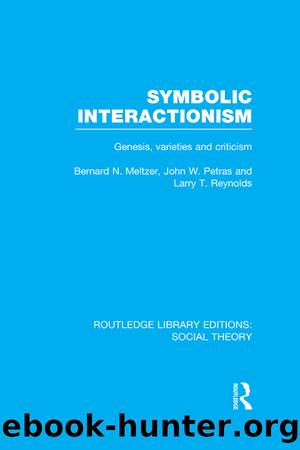Symbolic Interactionism (RLE Social Theory) by Bernard Meltzer John Petras Larry Reynolds

Author:Bernard Meltzer, John Petras, Larry Reynolds [Bernard Meltzer, John Petras, Larry Reynolds]
Language: eng
Format: epub
ISBN: 9780710080561
Goodreads: 4027561
Publisher: Routledge
Published: 1975-06-01T00:00:00+00:00
ETHNOMETHODOLOGY
Several writers have discussed the affinities (for example: Denzin, 1969, 1970; Dreitzel, 1970; Petras and Meltzer, 1973; Wallace, 1969; Warshay, 1971) and the differences (for example: Deutscher, 1973; Douglas, 1970c; Heap and Roth, 1973; Hinkle, 1972; Zimmerman and Wieder, 1970) between ethnomethodology and symbolic inter-actionism. We agree with Wallace, who writes: âInsofar as ethnomethodology embraces a theoretic (rather than methodologic) viewpoint, it is clearly symbolic interactionistâ (1969: 35). Hence, we shall examine ethnomethodology as a variation of the general interactionist perspective.
H. Garfinkel, leading progenitor of ethnomethodology, has been on the faculty of the University of California (Los Angeles) since 1954. From this post he has developed and led a group of thinkers (several now at the Santa Barbara branch of the University of California) who have felt themselves to be adherents of an embattled, âencapsulatedâ speciality, targets of contemptuous rejection by mainstream American sociology. His intellectual precursors have included, most notably, A. Schutz, E. Husserl, M. Merleau-Ponty, A. Gurwitsch, and other phenomenologists, as well as various linguistic philosophers. Of these former, Schutz has been most influential in Garfinkelâs thinking; but, T. Parsons, one of Garfinkelâs mentors at Harvard during his doctoral studies, has also exerted important influence.4
Any attempt to grasp the nature of ethnomethodology must come to grips with Garfinkelâs convoluted, opaque prose. Additionally, one must acquire a degree of facility with a large array of esoteric concepts, such as the following: âbracketing,â âdeep rules,â âdocumentation,â âepoche,â âet cetera clause,â âglossing,â âidealization,â âreduction,â âreflexivity,â âsecond order conceptions,â âtypification,â etc. With this caution in mind, we shall follow the lead of P. Filmer (1972: 206-7) and present some of the many âdefinitions,â or delimitations of ethnomethodologyâs scope offered by Garfunkel:
Ethnomethodological studies analyze everyday activities as membersâ methods for making those same activities visibly-rational-and-reportable-for-all-practical-purposes, i.e. âaccountable,â as organizations of commonplace everyday activities. The reflexivity of that phenomenon is a singular feature of practical actions, of practical circumstances, of common sense knowledge of social structures, and of practical sociological reasoning. By permitting us to locate and examine their occurrence the reflexity of that phenomenon establishes their study.
Their study is directed to the tasks of learning how membersâ actual, ordinary activities consist of methods to make practical actions, practical circumstances, common sense knowledge of social structures, and practical sociological reasoning analyzable; and of discovering the formal properties of commonplace, practical common sense actions, âfrom withinâ actual settings, as ongoing accomplishments of those settings. The formal properties obtain their guarantees from no other source, and in no other way (1967: vii-viii).
The following studies seek to treat practical activities, practical circumstances, and practical sociological reasoning as topics of empirical study, and by paying to the most commonplace activities of daily life the attention usually accorded extraordinary events, seek to learn about them as phenomena in their own right. Their central recommendation is that the activities whereby members produce and manage settings of organized everyday affairs are identical with membersâ procedures for making these settings âaccount-able.â The âreflexive,â or incarnate character of accounting practices and accounts make up the crux of that recommendation (1967: 1).
Download
This site does not store any files on its server. We only index and link to content provided by other sites. Please contact the content providers to delete copyright contents if any and email us, we'll remove relevant links or contents immediately.
Introduction to Enterprise Service Management by InvGate Inc & Ariel Gesto(743)
Out of the Inner Circle: The True Story of a Computer Intruder Capable of Cracking the Nation's Most Secure Computer Systems by Bill Landreth(250)
The Magic Behind Blockchain: A Brief Non-Mathematical Overview by kruchten paul(248)
The Software Engineer's Guidebook: Navigating senior, tech lead, and staff engineer positions at tech companies and startups by Gergely Orosz(241)
Top AI Tools That Changed the Game in Digital Marketing by Saravanan Clinton(241)
Patterns of Software Construction by Stephen Rylander(222)
Creating Agile Organizations: A Systemic Approach by Ilia Pavlichenko & Cesario Ramos(211)
Artificial Intelligence in Byte-sized Chunks by Peter J. Bentley(193)
The Legend of Final Fantasy X by Damien Mecheri;(188)
Stakeholder Mapping Deep Dive by Bösenberg Peter(174)
Lean DevOps: A Practical Guide to On Demand Service Delivery by Robert Benefield(172)
The Offi cial Guide to Mermaid.js by Knut Sveidqvist Ashish Jain(167)
Mastering REST APIs by Sivaraj Selvaraj(167)
JIRA 5.2 Essentials by Unknown(160)
Embedding Artificial Intelligence into ERP Software by Unknown(153)
The Engineering Leader by Cate Huston(149)
Introduction to Computers: A detailed guide to Computer Applications by Banik Biswajit(137)
Business Writing for Technical People by Marshall Carrie;(134)
Agile From First Principles by Girvan Lynda;Girvan Simon; & Simon Girvan(132)
